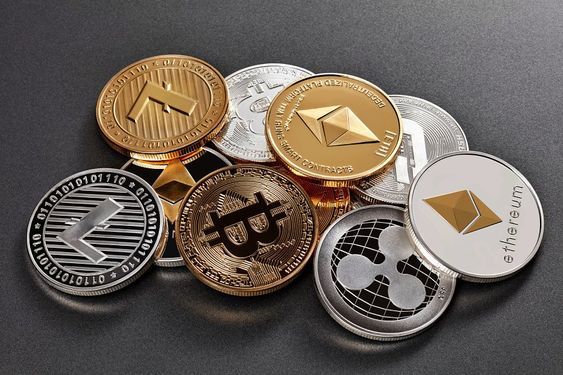Hello Blurtains!! This is my entry to the "Topic of the Week #2" by @fervi. My today's topic is "Cryptocurrency". If you want to know and participate in the contest I leave you the following link, Click Here.

Source
What Is Cryptocurrency?
Cryptocurrency (or “crypto”) is a structure of digital currency based on a network that is distributed across a large number of computers around the world. Decentralized network allows them to exist outside of governments and central authorities control. Cryptography enable people to buy, sell or trade them securely.
Types of Cryptocurrency
Most popular and valuable cryptocurrency is bitcoin created by anonymous called Satoshi Nakamoto in 2008. Now lots of cryptocurrencies in the market. But Except bitcoin every coin or token is altcoin ( Alternative Coin ). Top three altcoins are Ethereum, USDT(Tether), USD Coin.
Types of Altcoins
There are many types of altcoin such as:-
- Stable coins
- Meme Coins
- Payment Token
- Security Tokens
- Utility Tokens
Benefits and Weaknesses of Cryptocurrency
Benefits
Digital currencies address a brand new, decentralized worldview for cash. In this framework, unified go-betweens, like banks and money related organizations, are not important to uphold trust and police exchanges between two gatherings. Subsequently, a framework with digital forms of money disposes of the chance of a weak link, for example, an enormous bank, setting off a fountain of emergencies all over Planet, for example, which was closed in 2008 due to the depression of installations in the United States. Digital currencies promise to make it easier to move subsidies between two gatherings, without the need for a trusted outsider like a bank or visa agency..
Digital currencies vow to make it more straightforward to move subsidizes straightforwardly between two gatherings, without the requirement for a believed outsider like a bank or a Visa organization. Such decentralized moves are gotten by the utilization of public keys and confidential keys and various types of motivator frameworks, like evidence of work or verification of stake.
Some cryptocurrencies offer to earn passive income by staking. Staking involves using your cryptocurrencies to help verify transactions on a blockchain protocol. Though staking has it's risks, It's allow you to grow your crypto by holdings without buying more.
Cryptocurrency can produce benefits. The cryptographic money market has grown respectably over the past 10 years, at one point reaching nearly $2 trillion. As of May 2022, Bitcoin was worth more than $550 billion in the crypto market.
The settlement economy is striving for the most unambiguous use case of digital money. Currently, cryptographic forms of money, for example, Bitcoin act as semi-financial standards to facilitate the smooth movement of cash across borders. As a result, a government-issued currency is fully converted into Bitcoin (or another digital currency), transferred across borders and, therefore, fully converted into government-issued currency. This strategy makes the cash move interaction smoother and less expensive.
Weaknesses
Although they guarantee an anonymous form of exchange, digital currencies are really pseudonymous. They leave a computerized trail that agencies such as the Federal Bureau of Investigation (FBI) can interpret. This opens up possible outcomes for state-run administrations or government experts following the financial exchanges of ordinary residents.
Digital currencies have become a famous instrument with hoodlums for nefarious exercises, for example, tax evasion and illegal purchases. The example of Dread Pirate Roberts, who ran a commercial hub for selling drugs on the dark web, is notable so far. Digital currencies have likewise become a no 1 for programmers who use them to practice ransomware.
In principle, cryptographic forms of money are intended to be decentralized, with their abundance spread across many pools on a blockchain. In truth, ownership is deeply focused. For example, an MIT investigation discovered that just 11,000 financial backers typically hold 45% of the Bitcoin flood honor.
One of the downsides of digital forms of money is that anyone can mine them using a PC with an internet connection. In any case, mining the well-known digital form of money requires massive energy, now and again as much energy as entire nations use. Expensive fuel costs combined with the obsolescence of mining have concentrated mining among huge corporations with revenues running into the billions of dollars. As indicated by an MIT study, 10% of miners represent 90% of its mining limit.
However digital currency blockchains are profoundly secure, other crypto stores, like trades and wallets, can be hacked. Numerous cryptographic money trades and wallets have been hacked throughout the long term, in some cases bringing about large number of dollars worth of "coins" taken.
Digital forms of money exchange Public business sectors feel the ill effects of cost volatility. Bitcoin experienced a rapid flood and crash in its value, going as high as $61,374.28 in October 2021 , before falling in to $20,108.53
2018 and May 2022 collapse of cryptocurrency led to reports of suicidal investors.
What Is the purpose of Cryptocurrency?
Cryptocurrencies include cheaper and faster money transfers and decentralized systems that don't collapse at a single point of failure. Decentralization systems make it possible to exchange value and money independently of intermediary institutions such as banks.
The future of money is digital currency--Bill Gates
Everything on this blog i written what i knowledge and my research about Cryptocurrency from internet. Thank You For Reading My Blog. See You In The next Blog.